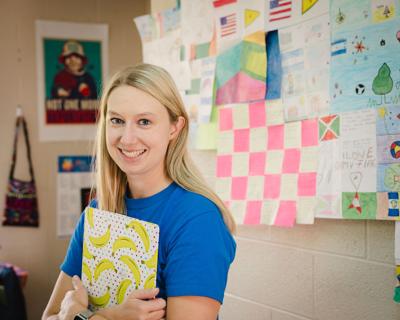In a district as big as Metro Nashville Public Schools, it can be easy to forget the many diverse needs students bring to the classroom — and the many avenues the district takes in attempting to address them.
MNPS’ Students with Interrupted Formal Education program is designed to assist students who have gone without schooling for two or more years. Because SIFE students are typically also new to the country, the program focuses on everything from getting them acquainted with Nashville and its school system to teaching English, catching students up academically and connecting them with community resources. It’s an effort that requires schoolwide input, from bus drivers to teachers. But throughout the district, school staff members are eager to find ways to better support the students.
SIFE students represent a small portion of MNPS’ population of English learners. According to MNPS data, 29 percent (23,976) of the district’s students have limited English proficiency, meaning they are active English learners or have transitioned out of the EL program between one and four years ago. More than 130 different languages are represented in this group, from Swahili to Haitian Creole, Burmese, Spanish and Arabic.
MNPS EL coordinator Megan Trcka supervises the district-wide SIFE program and tells the Scene there are currently 93 students enrolled — but the program expects the number to grow closer to 300 by the end of the school year. New students arrive frequently; they could be refugees whose schooling was interrupted by conflict, children whose families lived in rural areas without access to consistent education, youth who came to the country as unaccompanied minors, or those who had to forgo education to work and support their families.
Title VI of the Civil Rights Act of 1964 and the Equal Educational Opportunities Act of 1974 require students who are learning English to “participate meaningfully and equally in educational programs.” That means they must receive regular schooling while they’re learning English, and that’s where SIFE teachers come in — they provide extra support to both students and their fellow teachers. This includes weaving English instruction throughout the curriculum, using phrases from students’ native languages, inserting learning supports like adding visual aides above words, and addressing the social and emotional needs of the students, who oftentimes have experienced trauma.
The Scene recently visited two of the district’s eight SIFE locations: Antioch High School and John Early Museum Magnet Middle School. SIFE classrooms are decorated with flags representing El Salvador, Burundi, Honduras, Uganda, Kenya and more. In one classroom, books about each student’s native country are on display, and a sign features the phrase, “You can do hard things,” in their native languages. SIFE classes create safe spaces for students to work through new challenges with classmates experiencing similar circumstances — led by teachers who are specially trained to support them. But like any program in a large school district, it’s not perfect. More resources are always needed, and the SIFE program lasts for only a year after students arrive. After that, students often switch to zoned schools and lose some specialized services.
SIFE teacher Addison Barrack created a program to address that issue. She wants to make sure students don’t feel like they’ve been, as she puts it, “shot out of a cannon and then told to sink or swim.” Through the Nashville Public Education Foundation’s Teacherpreneur program — which helps cohorts of teachers develop and pitch ideas to compete for seed funding and cash prizes — Barrack was able to implement the SIFE Transition Facilitator program. NPEF funding and partial buy-in from the district has allowed the program to continue past its pilot year, though Barrack says she’s looking for more grants to sustain the work in future years. (Applications for the Teacherpreneur program open in the fall.)
Through the SIFE Transition Facilitator program, teachers take on a few extra hours of work each week to check in with former SIFE students who opt into the program. Through a case-management approach, SIFE Transition Facilitators monitor students’ attendance rates and grades, visit their homes, facilitate tutoring and goal setting, inform students about extracurricular options, check in with their teachers and more. A program impact report shows that participating students saw academic improvement, better attendance rates, more engagement with their schools and increased social confidence.
“I feel good about school,” one of the program’s sixth-grade students is quoted as saying in the impact report. “I can talk to my teachers more than before. … I ask for help more now like, ‘How do you say this word?’ My grades got better because the teachers teach me and help me.”
Despite the challenges SIFE students have faced, they bring many wonderful attributes with them, enriching the schools they attend and Nashville as a whole. Barrack says her students’ resiliency, enthusiasm and optimism inspire her, and celebrating wins each day brings much joy and excitement.
“The goal is for them to feel that way all of the time, and feel successful and proud of themselves, and to feel welcomed and accepted and celebrated,” says Barrack.





